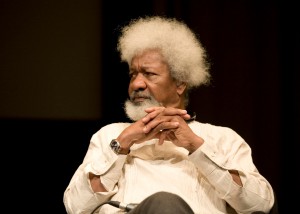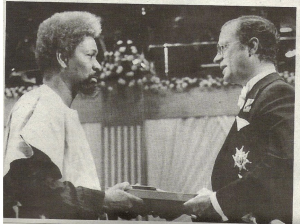
Wole Soyinka; Writer of plays, novels, political memoirs, and an activist who the Nobel committee described as “one of the finest poetical playwrights that have written in English…full of life and urgency.” Wole Soyinka was in October 1986 awarded the Nobel Prize for Literature; the first African to be so honoured. Soyinka is both a literary giant and a fierce social critic who was a thorn in the flesh of various despotic regimes especially in Nigeria. In 1967 at age 33, he was detained without trial by the General Yakubu Gowon regime for his criticism of the government’s actions over the Biafran war and labelling it as “a disastrous and an inglorious war.”
Though widely respected, he is often criticised for the difficulty and obscurantism which characterise his literary works, others fault him for founding the National Association of Sea Dogs which they allege gave birth to the modem day deadly cult groups that exist in Nigerian higher institutions.
Place of Growth
Born July 13 1934 at Abeokuta, Soyinka grew up in an Anglican mission compound in Aké and also spent time in his father’s ancestral home in Isara, Ijebu Remo. He would not only witness, but also run errands for the women, among whom was his mother, a trader, who led alongside hundreds by sister, Funmilayo Ransome Kuti, would defy the authority of the Alake, Ladapo Ademola, leading him to abdicate the throne in 1948. Soyinka’s father, a primary school headmaster whose initials he imagined as “essay” afforded him access to classical Greek tragedies such as the Medea of Euripides, which engaged his mind profoundly. In his words, “The greatest threat to freedom is the absence of criticism.” Such was his philosophy, his life and career which took him to the prison during Nigeria’s troubled years and around the world as one of Africa’s most respected voices.
Education
Soyinka was educated at St. Peter’s School, Ake Abeokuta; Abeokuta Grammar School, 1944-45; Government College Ibadan, 1946-50, University College, (now University of Ibadan), Ibadan, 1952-54, University of Leeds, England, 1954-57.
Travels
Encouraged by the interest shown in his play, Lion and the Jewel by members of London’s Royal Court Theater, Soyinka left for London to work as a dramaturgist at the Royal Court of Theater in London 1958-59. With the Rockefeller bursary he returned to Nigeria in 1960 and to found the 1960 Mask, a theatre company and to study African drama.
Public Service
Soyinka was also the pioneer chairman of the Federal Road Safety Corps, FRSC.
Activism
On the eve of Nigeria’s independence, his work was selected and commissioned for the national celebration. Soyinka’s Dance of the Forest prophetically called for candid introspection. It did not take long before the newly independent Nigeria fell apart, and Soyinka participated in correcting the injustice, albeit hilariously with his substitution of his own recorded broadcast for the Premier’s message on the radio. His next moments would be spent behind bars. He also ran into trouble when he was during the Nigerian Civil War, suspected of sympathizing with the separatist army.
Literary Works

While serving his second jail term, Soyinka translated The Forest of a Thousand Demons from Yoruba, a fantastical novel by D. O. Fagunwa. After his release in 1969, Soyinka left Nigeria and did not come back till 1975 when there had been a change of power. For the next one decade he continued with his activism, also through his days at the University of Ife. The book which he wrote on his solitary confinement, The Man Died was banned by a court of law in 1984.
Besides being the artistic director and founder of the Orisun Theatre, Soyinka was also a founding member of the famous Mbari Writers and Artists Club, Ibadan, which produced the cream of the first generation of Nigerian authors. He also founded and edited other literary magazines and scholarly publications. As an acclaimed director, Soyinka also sang, danced, hunted and did other cultural things. His plays, poems and novels are classic workfof arts of which the country prides itself. Some of them
include A dance of the Forest. The Lion and the Jewel. The Trials Brother Jero, The Strong Breed, Kongi’s Harvest, Death and the King’s Horseman, King Baabtt (plays); the Interpreters, The Man Died, Ake; The Years of Childhood (non-fiction), Idanre and Other poems, A Shuttle in the Crypt (poetry), Blues for the Prodigal (film).
Soyinka’s works covered politics, and literacy, and humanity. His play, The Trial of Brother Jero, is a light satirical expression of religion. In the play he presents to the reader a person who hides under the Church Brotherhood to bring people to supine submissions. To him, modern religions are unideal and he considers himself fortunate being an adherent of African Traditional Religion. In his book titled Ake, The Years of Childhood, Wole Soyinka acquaints the world with his childhood.
Accomplshments
Soyinka is a man of many awards, recognized for his struggles and clamors nationally and internationally among theses are : Prisoner of Conscience Award by Amnesty International (1968), the Honoris Causa doctorate from the University of Leeds, 1972, Commander of the Order of the Federal Republic (1986), the Nobel Prize in Literature, 1986. Agip Prize in Literature, 1986, Commander of the Order of Merit, Italian Republic (1990), Honorary doctorate, Harvard University, 1993. The 1994 UNESCO Goodwill Ambassador for the Promotion of African culture, human rights, freedom of expression, media and communication. Academy of Achievement Golden Plate Award, 2009. At the Faculty of Arts, University of Ibadan, his alma mater, Wole Soyinka is compared in artistic scholarship with the veteran writer William Shakespeare with their initials (WS) graphically intertwined.





















